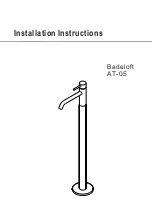
INSTALLATION
A-5
A-5
RANGER 305D
Retur
n
to
Section
TOC
Retur
n
to
Section
TOC
Retur
n
to
Section
TOC
Retur
n
to
Section
TOC
Retur
n
to
Master
TOC
Retur
n
to
Master
TOC
Retur
n
to
Master
TOC
Retur
n
to
Master
TOC
VEHICLE MOUNTING
Improperly mounted concentrated loads may
cause unstable vehicle handling and tires or other
components to fail.
• Only transport this Equipment on serviceable
vehicles which are rated and designed for such
loads.
• Distribute, balance and secure loads so vehicle
is stable under conditions of use.
• Do not exceed maximum rated loads for compo-
nents such as suspension, axles and tires.
• Mount equipment base to metal bed or frame of
vehicle.
• Follow vehicle manufacturerʼs instructions.
------------------------------------------------------------------------
HIGH ALTITUDE OPERATION
At higher altitudes, output derating may be necessary. For max-
imum rating, derate the machine 2.5% to 3.5% for every 1000 ft.
(305m). Due to new EPA and other local emissions regulations,
modifications to the engine for high altitude are restricted within
the United States and some European Countries. Use above
6000 ft.(1828 m) may be limited due to poor engine performance
or excessive exhaust smoke. An authorized Kubota engine field
service shop should be contacted to determine if any adjust-
ments can be made for operation in higher elevations locally.
HIGH TEMPERATURE OPERATION
At temperatures above 104°F(40°C), Welder output derating is
necessary. For maximum output ratings, derate the welder out-
put 2 volts for every 50°F(10°C) above 104°F(40°C).
Cold Weather Starting & Operation:
The Kubota engine used in the Ranger 305D can be
started in temperatures as low as 5°F (-15°C). At tem-
peratures below 23°F (-5°C) it is recommended that
No. 1D diesel fuel is used in place of No. 2D. Allow
engine to warm up before applying a load or switching
to high idle. Lincoln Electric supplies a Cold Weather
Kit if the unit is to be used in Cold Weather Extremes
for long periods. See Field Installed options in the
Accessories
section of this manual.
LIFTING
The RANGER 305D weighs approximately 775lbs. (352kg.) with
a full tank of fuel (698 lbs. less fuel). A lift bail is mounted to the
machine and should always be used when lifting the machine
• Lift only with equipment of ade-
quate lifting capacity.
• Be sure machine is stable when
lifting.
• Do not lift this machine using lift
bail if it is equipped with a heavy
accessory such as trailer or gas
cylinder.
FALLING
• Do not lift machine if lift bail is
EQUIPMENT can
damaged.
cause injury.
• Do not operate machine while
suspended from lift bail.
-------------------------------------------------------------------------------
WARNING
WARNING
DO NOT USE ETHER OR STARTING FLUID FOR
STARTING. SEVERE DAMAGE TO THE ENGINE
WILL RESULT.
------------------------------------------------------------------------
TOWING
The recommended trailer for use with this equipment for road, in-
plant and yard towing by a vehicle
1
is Lincolnʼs K957-1. (See
Accessories Section of this manual for trailer and trailer options).
If the user adapts a non-Lincoln trailer, he must assume respon-
sibility that the method of attachment and usage does not result
in a safety hazard nor damage the welding equipment. Some of
the factors to be considered are as follows:
1. Design capacity of trailer vs. weight of Lincoln equipment and
likely additional attachments.
2. Proper support of, and attachment to, the base of the weld-
ing equipment so there will be no undue stress to the frame-
work.
3. Proper placement of the equipment on the trailer to insure
stability side to side and front to back when being moved and
when standing by itself while being operated or serviced.
4. Typical conditions of use, i.e., travel speed; roughness of sur-
face on which the trailer will be operated; environmental con-
ditions; like maintenance.
5. Conformance with federal, state and local laws.
1
1
Consult applicable federal, state and local laws regarding specific requirements
for use on public highways.
WARNING












































